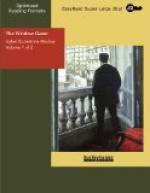“Don’t know as I can just hit on a name,” said Mr. Johnston. “Doesn’t come natural to me to be free with language.”
It had been pleasant enough on the wharf at first and certainly it had been worth something to see the fog come in. Its incredible advance, wave upon wave of massed and silent whiteness, had held him spellbound. While he had thought it still far off, it was upon him— around him, behind him, everywhere!
But perhaps it would go as quickly as it had come.
He had heard that this is sometimes a characteristic of fog. Fortunately he had already selected a keg upon which to sit, so with a patient fatalism, product of a brief but lurid career in Flemish trenches, he resigned himself to wait. The keg was dry, that was something, and if he spread the newspaper in his pocket over the most sciatic part of the shrapneled leg he might escape with nothing more than twinges.
How beautiful it was—this salt shroud from the sea! How it eddied and funneled and whorled, now massing thick like frosted glass, now thinning to a web of tissue. Suddenly, while he watched, a lane broke through. He saw clearly the piles at the wharf’s end, a glimpse of dark water, and, between him and it, a figure huddled in a cloak—a female figure, also sitting upon an upturned keg. Then the magic mist closed in again.
“How the deuce did she get there?” the professor asked himself crossly. “She wasn’t there before the fog came.” He remembered having noticed that keg while choosing his own and there had been no woman sitting on it then. “Anyway,” he reflected, “I don’t know her and I won’t have to speak to her.” The thought warmed him so that he almost forgot to shiver. From which you may gather that Professor Spence was a bachelor, comparatively young; that he was of a retiring disposition and the object of considerable unsolicited attention in his own home town.
He arose cautiously from the keg of nails. It might he well to return to the boatshed, even at the risk of falling into the Inlet. But he had not proceeded very far before, suddenly, as he had hoped it would, the mist began to lift. Swiftly, before the puff of a warmer breeze, it eddied and thinned. Its soundless, impalpable pressure lessened. The wharf, the sea, the city began to steal back, sly, expressionless, pretending that they had been there all the time. Even Mr. Johnston could be clearly seen coming down from the boatshed with a curious figure beside him—a figure so odd and unfamiliar that he might have been part of the unfamiliar fog itself.
“Well, you’ve certainly struck it lucky today,” called the genial Mr. Johnston. “This here is Doc. Farr’s boy. He’s going right back over there now and he’ll take you along—if you want to go.”
There was a disturbing cadence of doubt in the latter part of his speech which affected the professor’s always alert curiosity, as did also the appearance of the “boy” reputed to belong to Dr. Farr. How old he was no one could have guessed. The yellow parchment of his face was ageless; ageless also the inscrutable, blank eyes. Only one thing was certain—he had never been young. For the rest, he was utterly composed and indifferent, and unmistakably Chinese.




